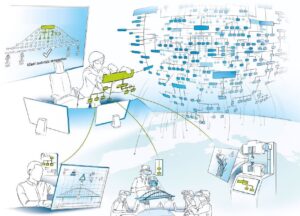
Source: NFDI-MatWerk
In our last article Eight NFDI consortia with RWTH participation are funded by the DFG! we reported on the funding decision of the Joint Science Conference (GWK) within the framework of the National Research Data Infrastructure (NFDI). As one of ten consortia – eight of them with RWTH participation – NFDI-MatWerk now receives a five-year grant for the infrastructure development of a common materials research data space. In our new blog post, we introduce you to the initiative.
NFDI-MatWerk stands for National Research Data Infrastructure for Materials Science & Engineering
As part of the development of the NFDI, the NFDI-MatWerk consortium is focusing on the research area of materials science and engineering. This is an interdisciplinary research field that combines physics, chemistry, mechanics and electrical engineering.
Materials are the basis of progress
The aim of materials science and materials engineering is to characterize the physical mechanisms in materials and to develop resource-saving high-performance materials with the most ideal properties possible for the respective application. Manufacturing processes are studied accordingly and modeled in such a way that materials and components and systems made from them have the necessary service life and the best possible recyclability. Experts optimize here from the atomic scale to the macro or component scale. Processing steps influence the internal material structure on the various scales and thus determine the mechanical and functional properties. At present, the research groups each still use their own tools and standards for data processing and storage for the data they generate through experiments and simulations.
The MatWerk community is developing a jointly usable research data infrastructure
The digital data space envisaged by the MatWerk community must be able to map the various highly complex interrelationships between the different material data and be as uncomplicated to use as possible in order to be able to develop synergy effects. Data from the scientific groups distributed across Germany should be able to be addressed via a so-called knowledge graph-based infrastructure in such a way that fast, complex search queries and evaluations become possible. Such a technical achievement also provides an excellent basis for next-generation artificial intelligence in the field of materials engineering.
Tasks of the IT Center in NFDI-MatWerk
The IT Center is working with the project partners in the Materials Data Infrastructure Task Area on:
- a reliable digital platform that enables the digital representation of materials data and MSE-specific metadata that conforms to FAIR principles. This will be realized through a data space fed by a Linked Data knowledge graph.
- comprehensive metadata services in which metadata ontologies are implemented. These will allow the entire processing history of samples to be recorded, data to be easily searched, collected for analysis, and edited and added according to the needs of individual researchers.
- access management via an Authentication & Authorization Infrastructure (AAI) that will enable proof of authorship and enable data provenance, as well as cross-organizational access to data and computational resources.
- long-term technical support for users and local installations, and a sustainable, cost-effective operating and compensation model for individual storage providers, central institutional providers, and cloud providers.
Renowned research institutions like RWTH stand behind NFDI-MatWerk
The consortium, represented by Prof. Chris Eberl of the Fraunhofer Institute for Mechanics of Materials IWM as spokesperson, consists of renowned German research institutions, including eleven applicants and a further 15 associated institutions. RWTH Aachen University is also among the applicant institutions. It is represented by Prof. Dr. Matthias Müller from the IT Center of RWTH Aachen, Prof. Dr. Stefan Sandfeld and Prof. Dr. Ruth Schwaiger from Forschungszentrum Jülich.
Learn more
Feel free to visit the NFDI-MatWerk website for more information. In addition, the consortium’s published proposal is also available for review. A look at our FDM blog is also worthwhile.
Responsible for the content of this post is Sophia Nostoff and Marius Politze.




